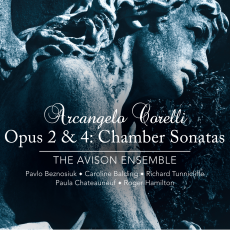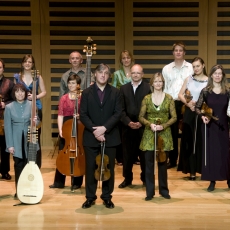The Avison Ensemble - Corelli: Opus 2 & 4: Chamber Sonatas - BBC Radio 3: CD Review
Andrew McGregor & Simon Heighes
SH: ‘We need to turn our ears back to late 17th century England when Corelli's music first appeared. It was taken up with such enthusiasm, that people described it as the very bread of life and still today it is absolutely vibrant and here, still sounding absolutely fresh from the oven.'
Track
AM: ‘Lovely ornamentation there...'
Track
AM: ‘...I love the way, The Avison Ensemble, after that first sequence of chord changes, they just let it disappear, didn't they? There was no rush to start the second phrase. A lovely sense of space.'
SH: ‘Yes, that's right. Classic Corelli is so simple, so elegant and so restrained in that performance. And so influential ...'
AM: ‘And that was one of the more sober and gently poised moments. But Corelli was a pretty fine player by all accounts - how virtuosic do these sonata get? Or is that not really the point here?'
SH: ‘Well it's interesting and I think there are two schools of thought here. Corelli was a modest guy. He was not a flash fiddler. He was a chamber, he was a team player rather than a fabulous soloist. And there is a sense in which The Avison Ensemble have picked up on that. I find, although we started with a dance which was nicely ornamented, the Avison Ensemble leave it pretty plain on the whole. It's all about gestures, it's all about line, all about simple textures, there's not too much complication here, and it's all very gentle. I really like it, they're tapping into this 18th century Georgian way of playing Corelli, where if you wanted to get into a concert, you brought your violin or cello along and you played because Corelli was simple enough for everyone to enjoy and for everyone to sight read. And of course they became so well known everyone knew them anyway. And there is a sense in which the Avison Ensemble really do bring that back. I think it's this kind of English love for the simplicity of the music. They're not over complicating it.'
AM: ‘There are serious demands as well. Many of them musical rather than technical. You've gone for a really rather wonderful chaconne for the next example...'
Track
AM: ‘Simon, I like what Corelli wrote. I'm not sure I need a great deal more than that.'
SH: ‘...the Avison Ensemble are very resectful, they don't apologise for the simplicity of the music. We don't want too many extraneous improvisations that we have to listen to time and time again.'
AM: ‘Well that's a point because if you put them down on a recording you do have to listen to the same ornamentation over and over whereas in live performance, I bet they would do more than that, wouldn't they?'
SH: ‘Oh certainly. But what I think is when you're doing a complete edition like this, why not treat a few movements to a little bit more colour? It's very English, it's very gentile. Wouldn't it be nice just to up the tempo from time to time? Maybe even with a bonus track of a live performance?'
AM: ‘It is very beautiful. A lovely recording as well.'
SH: ‘Beautiful. Very clear. Absolutely transparent.'

